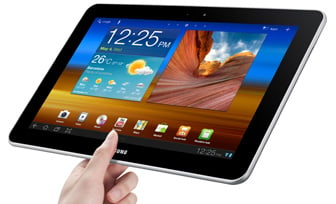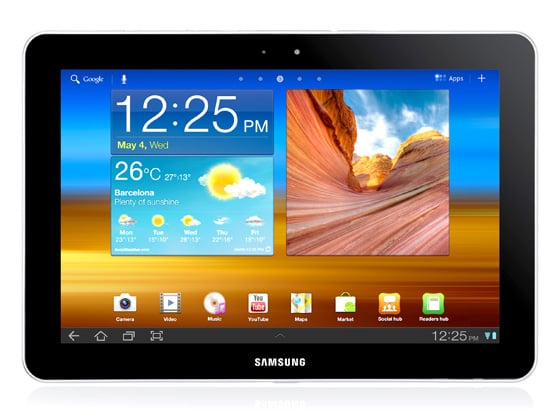Original URL: https://www.theregister.com/2011/08/15/samsung_tab_android_trouble/
Samsung's lovely illegal tablet: Why no one wants to know
Even without injunctions, it's a hard sell
Posted in Personal Tech, 15th August 2011 10:28 GMT
Analysis Quite unexpectedly I found myself in possession of some very hot, illegal property last week. Not a looted plasma TV but rather the Samsung Galaxy Tab 10.1, which thanks to legal injunctions is disappearing from channels all over Europe. Vodafone is the latest to cancel its orders.
It is a beautifully designed piece of hardware, but I fear it would soon be disappearing even without a shove from Apple's lawyers. It faces a dilemma shared by many other competitors, one I pondered on recently: it is extremely hard to sell a rival tablet right now.
There are more excuses than solutions.
Nvidia's CEO Jen-Hsun Huang recently offered up one or two. "It's a point-of-sales problem. It's an expertise-at-retail problem. It's a marketing problem to consumers," he explained, before adding, for good measure: "It is a price-point problem. And it's a software richness of content problem."
Is that enough?
I took the Tab through its paces to see if Samsung had drawn any closer to resolving this apathy. This isn't a review – we've already run a very entertaining one here – but more of a whodunnit.

Midway between a computer and a dumb screen, the iPad makes a difficult target for rivals to aim at. I cannot emphasise enough the fact that iPad appears to have no killer app or singularly compelling use case – but it is phenomenally popular in spite of that. Aiming at the iPad is even harder now Apple is achieving some success at defending its design work, thanks to 38 lawsuits from Cupertino.
If you want the 20-second summary of the new Tab, here it is. Samsung has evidently thought long and hard about the problem, and in its second generation product, made a really fine piece of hardware. But for its software Samsung almost entirely relies on Google, and the Tab shows Google doesn't know what to aim at either. Rather like a foreign stenographer who's not familiar with the language they're transcribing, Google has come up a rather literal translation. It leaves the Samsung tablet midway between a computer and a dumb screen, too.
I'll start with the hardware. Samsung aims for the Sony crown these days, and this is evident in the design of the Tab.
The Tab is purposely a landscape-oriented device, which makes sense for watching movies but not many other use cases. People who want to use the device for reading e-books, for reading web pages, for perusing Twitter and Facebook streams, and for handling email in volume, want to maximise the vertical viewing area. Most of these "views" are list views. Portrait is still the best option here. So being primarily landscape is a differentiator, yes, but one that leaves the user turning the device through 90 degrees far more often than they should need to, and (as I found) leaves the main controls far away from where the hands usually rest. It is very light, making the original iPad feel like a monster, is nicely tapered and strongly and discretely put together. As you'd expect from a Samsung, the screen is terrific. It's a beautiful machine to hold and use.
Although the Tab has a slot for removable storage, it has been criticised for lacking HDMI and USB ports, and for aping the iPhone and iPod's one-connector-only design. These criticisms are merited, I think. You have to try harder when you're not the market leader, and while Apple makes a minority of users who want HD output or photo-import ability jump through hoops (aka, spending another £25 per dongle), this kind of value should be bundled.
What are we building here? Is it a computer or just a fancy picture frame?
Performance is excellent, the Tab did not exhibit too many creaks and grinds as the machine loaded up with running applications, and it executed the portrait-to-landscape turn smoothly. The TouchPad is badly let down by its performance, I found, and takes far too long to start applications. You end up cursing the multitasking rather than being grateful for it.
Android's Honeycomb is where things start to get sketchy. Google's browser is fabulous, and blows Safari away for performance and functionality. It doesn't have as many sophisticated features as the third-party options available for iOS, such as those on offer from Opera or iCab. But nor did it have the murky font rendering of the HP f'slab. Annoyingly, it continues a first-generation flaw: insisting on showing the mobile (typically iPhone-optimised) version of websites.

But many of the design choices that made Android sellable on a mobile simply don't suit a larger device. Notifications feel clumsy, and the back button was either made larger or removed. And given the dilemma of opting to be a computer or a media player, it tries too hard to be a computer. I appreciate that scaling a UI so beginners can grasp it and experienced users can perform advanced tasks quickly is a real design challenge. But despite the advantage of burying the underlying file system, Honeycomb is still too fiddly and fuzzy. Beginners need a deterministic system – not one so many different panels and screens. The UI drastically needs to be simplified.
When Phone UIs don't scale
Apple constantly gets away with quite staggeringly odd design decisions in an effort to simplify things and maintain consistency. The iPad was widely criticised at first for its Noddy home screen; there were no software or hardware concessions made regarding multitasking or task-switching. But the result is something my two-year-olds can easily navigate, and which really doesn't need a manual.
Now you may argue that Apple has simply postponed the day it has to incorporate more sophisticated features into the UI without breaking its simplicity. Perhaps you're right: we'll see how well iOS 5 fits the bill. But the Honeycomb experience is one that exposes that manufacturers' dilemma: what are we building here? Is it a computer or just a fancy picture frame – a media player?
After 18 months, I don't think they know. For Apple, the iPad is really something that drives people to "stuff" – to music, web pages, social media streams and eventually to TV and movies – and gets out of your way in doing so.
Oh, I forgot something. Battery life, you ask?
Eh, it's Android. You have a guess how good it is. ®